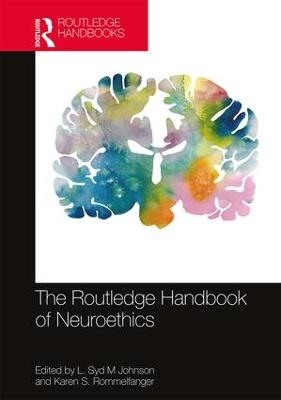
The Routledge Handbook of Neuroethics
Routledge (Verlag)
978-1-138-89829-5 (ISBN)
The Routledge Handbook of Neuroethics offers the reader an informed view of how the brain sciences are being used to approach, understand, and reinvigorate traditional philosophical questions, as well as how those questions, with the grounding influence of neuroscience, are being revisited beyond clinical and research domains. It also examines how contemporary neuroscience research might ultimately impact our understanding of relationships, flourishing, and human nature. Written by 61 key scholars and fresh voices, the Handbook’s easy-to-follow chapters appear here for the first time in print and represent the wide range of viewpoints in neuroethics. The volume spotlights new technologies and historical articulations of key problems, issues, and concepts and includes cross-referencing between chapters to highlight the complex interactions of concepts and ideas within neuroethics. These features enhance the Handbook’s utility by providing readers with a contextual map for different approaches to issues and a guide to further avenues of interest.
Chapter 11 of this book is freely available as a downloadable Open Access PDF under a Creative Commons Attribution-Non Commercial-No Derivatives 3.0 license. https://www.routledgehandbooks.com/doi/10.4324/9781315708652.ch11
L. Syd M Johnson is Associate Professor of Philosophy and Bioethics in the departments of Humanities and Kinesiology and Integrative Physiology at Michigan Technological University. Her current research focuses on ethical and epistemological issues in disorders of consciousness and sport-related neurotrauma. Karen S. Rommelfanger is an Assistant Professor in the departments of Neurology and Psychiatry and Behavioral Sciences, the Neuroethics Program Director at Emory University’s Center for Ethics, and Neuroscience Editor-in-Residence at the American Journal of Bioethics Neuroscience. A neuroscientist and ethicist, her current research explores how evolving neuroscience and neurotechnologies challenge societal definitions of disease and medicine. She is a member of the Neuroethics Division of the NIH BRAIN Initiative.
Contents
List of Contributors
Introduction
Part I. What is Neuroethics?
The Competing Identities of Neuroethics: Remarks on Theoretical and Methodological Assumptions and Their Practical Implications for the Future of Neuroethics
Eric Racine and Matthew Sample
Neuroethics and the Neuroscientific Turn
Jon Leefmann and Elisabeth Hildt
Part II. The Ethics of Neuroscience
Thinking Differently: Neurodiversity and Neural Engineering
Sara Goering
The Ethics of Expanding Applications of Deep Brain Stimulation
Markus Christen and Sabine Müller
4.1 Spotlight: Neuromodulation
4.2 Spotlight: Ablation Techniques
Markus Christen and Sabine Müller
The Ethics of Prodromal and Preclinical Disease Stages
Jalayne J. Arias, Jennifer Sarrett, Rosa Gonzalez, Elaine F. Walker
Disorders of Consciousness and the Use of Neurotechnologies: An Ethical Perspective
Orsolya Friedrich and Ralf J. Jox
Placebo for Psychogenic Disorders: Ethics, Illness, and Treatment Narratives
Lindsey Grubbs and Karen S. Rommelfanger
Cosmetic Neurology and the Ethics of Enhancement
Anjan Chatterjee
Modafinil and the Increasing Lifestyle Use of Smart Drugs by Healthy People: Neuroethical and Societal Issues
Sebastian Porsdam Mann and Barbara J. Sahakian
Neuroenhancement and Therapy in National Defense Contexts
Michael N. Tennison and Jonathan D. Moreno
Moral Neuroenhancement
Brian D. Earp, Thomas Douglas, and Julian Savulescu
My Brain Made Me Do It?: Neuroscience and Criminal Responsibility
Valerie Gray Hardcastle
Your Brain on Lies: Deception Detection in Court
Julie A. Seaman
13.1 Spotlight: Lie Detection Technologies
Valerie Gray Hardcastle
Neuroprivacy and Cognitive Liberty
Paul Root Wolpe
Chronic Traumatic Encephalopathy: Ethical, Legal, and Social Implications
L. Syd M Johnson
Neurohype: A Field Guide to Exaggerated Brain-Based Claims
Scott O. Lilienfeld, Elizabeth Aslinger, Julia Marshall, and Sally Satel
Neuroscience Online: Real Ethical Issues in Virtual Realms
Ryan H. Purcell and Karen S. Rommelfanger
Home Use of tDCS: From "Do-It-Yourself" to "Direct-To-Consumer"
Anna Wexler and Peter B. Reiner
Part III. The Neuroscience of Ethics
Moral Reasoning
John D. Banja
Informing Ethical Decision Making
Adam Feltz and Edward T. Cokely
Brain Implants: Implications for Free Will
Walter Glannon
21.1 Spotlight: Free Will
Walter Glannon
Personal Identity and Brain Identity
Georg Northoff and Nils-Frederic Wagner
22.1 Spotlight: Mind-Body Identity: Are We Just Our Brains?
Kimberly Van Orman
Values, Empathy, and the Brain
Nina L. Powell and Stuart W.G. Derbyshire
Moral Robots
Matthias Scheutz and Bertram F. Malle
24.1 Spotlight: Artificial Intelligence, Consciousness, and Moral Status
Susan Schneider
Part IV. Expanding the Frame
Neurogenderings and Neuroethics
Cyd Cipolla and Kristina Gupta
Neurodiversity, Neuroethics, and the Autism Spectrum
Emily Y. Liu
RDoC’s Special Kind of Reductionism and its Possible Impact on Clinical Psychiatry
Luc Faucher and Simon Goyer
Neuroethics in Context: The Development of the Discipline in Argentina
Arleen Salles
Neuroethics in Japan
Tamami Fukushi, Taichi Isobe, Eisuke Nakazawa, Yoshiyuki Takimoto, Akira Akabayashi, Laura Specker Sullivan and Osamu Sakura
The Neurobiologic Embedding of Childhood Socioeconomic Status
Margaret A. Sheridan
Prenatal and Neonatal Neuroethics: The Moral Significance of Painience
L. Syd M Johnson
Animal Minds: The Neuroethics of Nonhuman Dissent
Andrew Fenton and Adam Shriver
Index
| Erscheinungsdatum | 26.07.2017 |
|---|---|
| Reihe/Serie | Routledge Handbooks in Applied Ethics |
| Zusatzinfo | 13 Tables, black and white; 5 Line drawings, black and white |
| Verlagsort | London |
| Sprache | englisch |
| Maße | 174 x 246 mm |
| Gewicht | 1054 g |
| Themenwelt | Geisteswissenschaften ► Philosophie ► Ethik |
| Medizin / Pharmazie ► Gesundheitsfachberufe ► Hebamme / Entbindungspfleger | |
| Medizin / Pharmazie ► Medizinische Fachgebiete ► Medizinethik | |
| Studium ► Querschnittsbereiche ► Geschichte / Ethik der Medizin | |
| Naturwissenschaften ► Biologie ► Humanbiologie | |
| Naturwissenschaften ► Biologie ► Zoologie | |
| ISBN-10 | 1-138-89829-5 / 1138898295 |
| ISBN-13 | 978-1-138-89829-5 / 9781138898295 |
| Zustand | Neuware |
| Haben Sie eine Frage zum Produkt? |
aus dem Bereich


